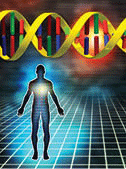Return to March/April 2014 articles.

Life can be incredibly hard. We all struggle with situations that are grossly unfair and tragic. When a drug addict rapes and murders an innocent child, all of us have to deal in some way or another with the question of where God was while this was happening. An atheist will respond to a situation like this with the claim that this is simply a proof that God does not exist, or he would not allow such a thing to take place. There is no question that the history of humanity is full of atrocities, abuses, and great injustices. Man's inhumanity to his fellow human beings is hard to comprehend and even harder to justify.
Atheism will turn to evolution to explain these things. Survival of the fittest and chance drive all experiences of human beings according to atheism. Evolutionists like E. O. Wilson have maintained that war is a product of our evolution, and would have us believe that war is inevitable. Richard Dawkins gives the atheist position very clearly:
The universe we observe has precisely the properties we should expect if there is, at bottom, no design, no purpose, no evil and no good, nothing but blind pitiless indifference … DNA neither knows nor cares. DNA just is. And we dance to its music (Dawkins 1995).
Huxley long ago equated man's existence “ ‘to the falling of a stone to earth or the ebb and flow of the tides.’ We have just happened, and flesh was made man by a long series of singularly beneficial accidents” (Smith 1976).
For Christians such mechanical views of human origins are not only unsupported by evidence, but are also inconsistent with our own nature. There are too many things that humans do that are not DNA-driven to accept the notion that all we see is void of design, purpose, and intelligence. By the same token we struggle with the view that God controls each drop of water and where it will land or that God preordains every tragedy that we experience in life. We know that Matthew 10:30 tells us that God knows how many hairs there are on our heads. Acts 17:26-28 expresses the fact that God knows our habitation and that we live and move and have our being in him. In spite of knowing all of that, we share the frustration of the psalmist as we see things happen that we do not understand. Psalm 10:1-12 (ERV) says it well, “Lord, why do you stay so far away? Why do you hide from people in times of trouble? The wicked are proud and make evil plans to hurt the poor, … these greedy people brag about the things they want to get. … They succeed in everything they do. … They make fun of all their enemies. … Again and again they hurt people who are already weak and suffering. … Lord get up and do something.”
Anyone who claims to have all the answers for the reality of life and all the bad things that happen should not be taken very seriously — be it an atheist view or a theist view. By the same token, there are some facts that are logical, biblical, and practical in this area of discussion. Here are a few ideas for your consideration.
ANSWER 1: OUR PURPOSE IN EXISTING IS NOT TO PERPETUATE OUR GENES.

Ultimately the question of why things happen as they do has to be interpreted in the context of what we believe is the purpose of our existence. The person who rejects the existence of God can only answer that question in biological terms. That is what Richard Dawkins does when he makes reference to DNA. Sociobiologists tend to propose that survival of the fittest demands that if we cannot survive, we will do whatever it takes to promote our genes. The males of animals such as lions and bears will kill some of the young of their own species apparently to force the females to mate again sooner. The suggestion is that this will give them the opportunity to infuse more of their genes into the population. There are so many cases where this is contradicted by evidence, that this proposal of a totally genetic purpose does not make sense scientifically. But for the atheist, purpose in life is a difficult issue.
From a Christian standpoint our purpose is rooted in the struggle between good and evil. Ephesians 6:12 (ERV) says it well, “Our fight is not against people on earth. We are fighting against the rulers and authorities and the powers of this world's darkness. We are fighting against the spiritual powers of evil in the heavenly places.” Ephesians 3:11 (ERV) tells us, “This agrees with the plan God had since the beginning of time. He did what he planned, and he did it through Christ Jesus our Lord.” We can read the book of Job and see him come to an understanding of God and a realization of his own purpose. At the end of all of his troubles Job says, “Lord, before all of this happened to me I had heard of thee by the hearing of the ear, but now my eye sees you” (Job 42:5 Clayton paraphrase).
If we understand this purpose and realize it is a spiritual battle that we are in, then we understand why God does not step in and fix it. He would be defeating his purpose in creating us. Heaven is when evil no longer will have access to us; but for us to be able to choose between good and evil, God cannot step in and prevent the logical consequences of our choices.
Understanding this makes it possible for me to look beyond the tragedies and losses in life. It gives me hope and makes me realize that the horrible consequences of human choices are temporary and something better lies ahead. It also gives me purpose in life. I want to be on God's side. My life has purpose and direction because I know why I exist.
ANSWER 2: EVIL IS REAL AND PERSONAL.

The Bible is full of cases where Satan deals personally with an individual. In Luke 22:3 we are told, “Then Satan entered Judas, …” To maintain that Judas' treachery in betraying Christ for 30 pieces of silver was not evil would be difficult for most rational human beings. In 2 Corinthians 12:7, 8 Paul says, “To keep me from becoming conceited, I was given a thorn in my flesh, a messenger of Satan, to torment me. Three times I pleaded with the Lord to take it away from me.” There are countless other cases where Satan afflicts or recruits someone for an evil purpose or to do harm. In the two cases above we see several answers.
What was the purpose of Jesus Christ coming to earth? “For God so loved the world that he gave his one and only Son, that whoever believes in him shall not perish but have eternal life. For God did not send his Son into the world to condemn the world, but to save the world through him. … Light has come into the world, but men loved darkness instead of light because their deeds were evil” (John 3:16-19). Ephesians 3:10-11 tells us that this was so that “the manifold wisdom of God should be made known to the rulers and authorities in heavenly realms, according to his eternal purpose which he accomplished in Christ Jesus our Lord.”
The death of Jesus was cruel and violent beyond comprehension. Why did God allow it? When Jesus was arrested Peter took out his sword to put a stop to the evil that was about to take place. Jesus told Peter to put away his sword, and he said that he could have called twelve legions of angels to stop what was happening. Jesus said that if he did that, how would the Scriptures be fulfilled that said it must happen this way? There was a personal purpose that Jesus had in allowing Satan to enter Judas, and such actions on Satan's part can cause tragedy. If you believe that all you have is this life, that makes no sense. If you believe that there is a purpose in our existence then you can understand there is a purpose, even in the bad things. God's purpose in allowing Jesus to be crucified and the impact on the struggle between good and evil should be obvious. The nature of human beings who have the capacity to choose allows rejection of God, but also makes love possible.
Paul's situation brings up a different dimension to this discussion. We do not know what the affliction was that Paul endured, but he referred to it as coming from Satan's angel or messenger 2 Corinthians 12:7). He also says it happened to keep him from becoming conceited. The Bible is full of statements and examples of the value of suffering. James 1:2-4 says, “Consider it pure joy, my brothers, whenever you face trials of many kinds, because you know that the testing of your faith develops perseverance. Perseverance must finish its work so that you may be mature and complete, not lacking anything.”
Let me make this personal. I have had some things in my life that have been very difficult. Having a child born with multiple birth defects including blindness, mental retardation, cerebral palsy, schizophrenia, and a form of muscular dystrophy has been “a messenger from Satan.” It was not a sin of my son's, or of mine, that caused congenital birth defects. God allowed it just as he allowed Paul to have something from Satan that afflicted him. I do not like it or the pain it has brought into my life. I have had my moments when I have cried out as the psalmist did in Psalm 10. My wife of 49 years died in 2008 due to the evil of 60 years of insulin-dependent diabetes. I felt so helpless and frustrated that I was begging God to take my life. Why did God allow me, a man trying to serve God, to endure all of this?
It is difficult to be arrogant or conceited in situations like these. I am a long way from being what I want to be, but I have learned to be patient and compassionate because of what I have been through. The story of John 9 is something I can really relate to. Here a man was born blind, and Jesus states clearly in verse 3 that it had nothing to do with sin. The event was used by God so that “the work of God might be displayed in his life.” Romans 8:28 tells Christians that “in all things God works for the good of those who love him, who have been called according to his purpose.” Evil is personal and real, but God can take whatever evil comes into our lives and make good things come from it. If you are an atheist and believe that life has no purpose and that there is nothing beyond our physical existence, then this makes no sense at all. Trying to make yourself believe that there is no such thing as evil and that chance is the only thing that governs your existence is a bigger leap of faith than believing in a personal God — and it is a blind, destructive leap.
ANSWER 3: THE CONSEQUENCES OF OUR BELIEFS ARE EVIDENCE.
All of us, whether atheists or believers have to contend with natural tragedy. Dealing with man-made tragedy and cruelty is a different issue, because it is firmly rooted in what a person believes. What are the logical consequences of being an atheist? What does the atheist belief system logically lead to? The same question can be asked of any religion, because there are religions that teach things which are evil. Galatians 6:7-8 says, “Do not be deceived: God cannot be mocked. A man reaps what he sows. The one who sows to please his sinful nature, from that nature will reap destruction; the one who sows to please the Spirit will reap eternal life.”

Atheists must base their view of evil and its consequences on the chance functioning of DNA. As Dawkins wrote, “DNA neither knows nor cares. DNA just is, and we dance to its music.” His statement that there “is, at bottom, no design, no purpose, no evil and no good” accurately sums up what an atheist must believe. So what guides a person in moral decisions and how does he or she deal with tragedy in life? How would my son born with multiple handicaps fit into such a belief system? Peter Singer, the head of the ethics department at Princeton University would euthanize my son. As an atheist he has to believe that my son is simply unfit in a world run by survival of the fittest. Singer would empty the care centers for the mentally ill and handicapped by simply euthanizing all who do not measure up to his definition of “fitness.” (For more on Singer see our bimonthly issue November/December 2010, page 26.) What prevents that definition from including the elimination of people based on racial characteristics? What kind of society would that be? To deny that evil exists, opens the door to horrors most of us can only imagine.
The consequences of a belief system also help us know what is from God and what is from man. Jesus said, “I am the way and the truth and the life. No one comes to the Father except through me” (John 14:6). When you look at what Jesus taught and how he dealt with life and evil, you see perfection. Matthew 5-7 provides a way to eliminate or at least mitigate most evil. Nowhere did Jesus encourage his followers to embrace or do anything that was evil or that would promote evil. If you read the Koran, you see a very different approach to the problems of this world. Much violence is encouraged (see Sura 47:3-5; 2:216; 5:37-39; 8:37-41; 9:4-7.) There have been those who called themselves Christians and engaged in evil acts such as religious wars, but the teachings of Jesus are void of evil. If followed, they will bring love, peace, harmony, and dignity to all human beings.
How can anyone look at what happens daily in the world as shown on TV, on the Internet, and in our newspapers and magazines and still deny the existence of evil? God has a purpose for each one of us, and this world is not the total of our existence. If we understand our purpose, realize that God has provided answers and help to us, and comprehend the consequences of following and not fighting evil, we can live through hard times. They are only temporary.
References:
Richard Dawkins, River Out of Eden [New York: BasicBooks, 1995], page 133.
Anthony Smith, The Human Pedigree [Philadelphia: J. B. Lippincott, 1976], page 103.
For the quotations from the Koran you can look at this website: http://quod.lib.umich.edu/k/koran/browse.html. The first number above refers to the “book” in the sites list and the second number refers to the “verse.”
Picture credits:
© Thufir. Image from BigStockPhoto.com
© Creatista. Image from BigStockPhoto.com.
© Alpy7. Image from BigStockPhoto.com
© Andrushko Galyna. Image from BigStockPhoto.com
